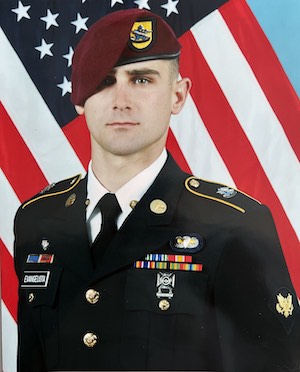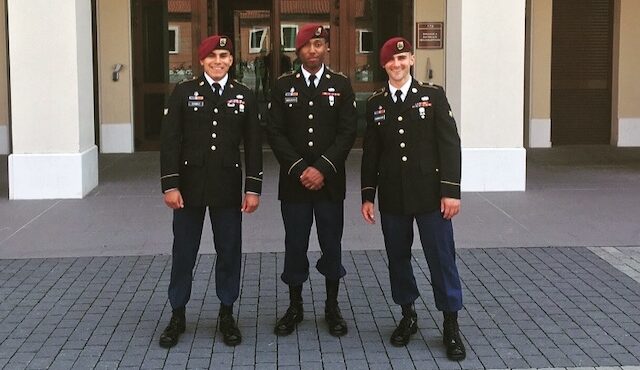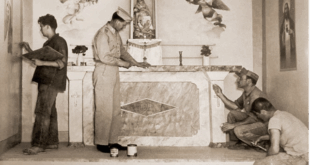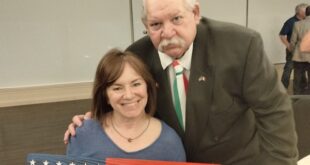A team-sport player from grade school through college, he felt drawn to the military because of the similar opportunity it provided to be a part of something bigger than oneself.
The middle of five children, Mark Evangelista was born in Wheaton, Illinois, to Mark and Suzanne Logan Evangelista. His great-grandparents emigrated from the Abruzzo region.
Evangelista grew up close to his large extended family. “We were always by family,” he says. “Sundays were either at our house, Grandma’s or my aunt’s house.”
His aunt and grandmother wrote down their recipes and their descendants had the good sense to preserve them. “The grandkids took these loose-leaf sheets of paper that have scribble on them and we kind of published it and made it so we could all have a copy,” says Evangelista. “It’s awesome, so it will never die.”
Evangelista participated in numerous sports at Lowell Elementary School, Franklin Middle School and Wheaton North High School, with an eye toward pursuing football at the collegiate level. He was captain of the team at Elmhurst College and graduated with a bachelor’s degree in exercise science.
As a young boy, Evangelista was interested in the military, influenced by his great-grandfather, a World War II Army veteran, and his grandfather, a Korean War Army veteran stationed at the Panama Canal. He spoke with a Marine recruiter while in high school but put thoughts of the military on hold until after college.
Evangelista’s interest in the military resurfaced during his senior year. “I just got that urge to serve my country and be a part of something bigger than myself,” he says. “I think that’s what I enjoyed most about playing sports, especially at the collegiate level. You know it’s not so much about you, it’s about what you can do for the team.”
A visiting Army recruiter spoke with Evangelista about becoming a combat medic and that was it. He graduated in May 2014 and one month later left for basic training at Fort Sill, Oklahoma. Evangelista was away from home for the first time and it was tough at first. “However, at the same time, it’s a calling that I felt for a really long time, starting at a young age, so I knew it was something that I was meant to do,” he says. “It was the right thing for me.”
 Evangelista attended combat medic training for five months at Fort Sam Houston, Texas, followed by airborne school at Fort Benning, Georgia. He received orders as a combat medic airborne for the 173rd Airborne Brigade Combat team in Vicenza, Italy, and was stationed there for two years.
Evangelista attended combat medic training for five months at Fort Sam Houston, Texas, followed by airborne school at Fort Benning, Georgia. He received orders as a combat medic airborne for the 173rd Airborne Brigade Combat team in Vicenza, Italy, and was stationed there for two years.
Evangelista participated in training exercises and missions in Italy, Germany, Poland, Croatia, Slovenia and Israel. “It was all about building relationships, building camaraderie with NATO forces and allies,” he says.
On a typical mission, Evangelista’s platoon boarded a plane at the Air Force base in Aviano, Italy, flew to their destination and parachuted in. Evangelista carried about 80 pounds of equipment, including his parachute, reserve chute, rifle, aid bag and supplies necessary to survive at least 30 days. “You’re gonna fall very fast and, honestly, a lot of the injuries I treated were directly after airborne operations once everyone hit the ground.”
Evangelista dealt with a lot of fractured legs and dislocated shoulders. He jumped in, hit the ground, gathered his rifle and equipment, and stopped to listen. “If anyone is calling out for help, that’s the first place I would go,” he says. “As a medic, once you hit the ground, that’s when your job starts.”
Humvees, field ambulances, tents, food and everything else necessary to be out in the field was parachuted in. Each soldier had a job duty and once the casualties were taken care of, the forward operating bases and combat support hospital were set up. “In the Army you’re always a soldier first,” Evangelista says. “I would say 50% of the time I was a medic, the other 50% I was fixing vehicles, helping construct the forward operating base, digging trenches, filling sandbags, etc.”
Evangelista worked together with the medics from other countries. “We’d be sharing different ways that we would treat casualties,” he says. Training together with foreign armies builds relationships and prepares the soldiers to be ready for any world conflict. “I think it rings true whether you’re talking about the military or athletics, the same principle, we practice how we play,” Evangelista says. “So everything we do, whether it’s a training exercise or a real mission, it’s as if it’s the real deal. It’s as if we’re jumping into Normandy, France, on D-Day.”
Back on base in Vicenza, Evangelista and his unit maintained their rifles and vehicles to be ready for their next mission. Occasionally, he went on missions with other units if they were short a medic. Evangelista developed a strong connection with soldiers in his unit and they spent their off-duty time together visiting Rome, Bologna, Florence and Venice. “We would travel when we could,” he says.
Evangelista trained with the Israeli Air Force for three months and while there visited the Dead Sea and ran the Tel Aviv Marathon along the Mediterranean Sea. He shares a memorable experience: “Growing up Catholic, being able to put your hand on the stone where Jesus was anointed with oil after he was taken down from the cross, it was just unbelievable.”
After two years in Italy, Evangelista transferred to the 44th Medical Brigade stationed at Fort Bragg, North Carolina, assigned as executive officer of the company. Evangelista was in charge of all the weapons and vehicles. “I was assigned over many millions of dollars’ worth of equipment.”
Evangelista was interested in becoming a nurse and enrolled at a local community college, taking prerequisite classes at night after his daily work duties. He was accepted into the DePaul master’s in nursing program and, in August 2018, one month after he was discharged from the Army as a Sergeant, he began classes.
He earned his master’s in nursing and spent two years in the private sector before working at Hines Veterans Hospital, his ultimate goal. “I’m a bedside nurse and also teach the hospital staff how to defend themselves against aggressive patients,” he says. “It’s great. I’m very blessed, very thankful with where I’m at.”
Evangelista firmly believes his military experience helps him relate to his patients. “Veterans know. They can tell, the way we talk, carry ourselves, how we operate,” he says. “We all share this unique bond and connection and it goes a really long way.”
Evangelista and his wife, Jaime (Johnson), have two children. Reflecting on his time in the Army, he says, “I would not have what I have today without the military, without the U.S. Army. The lessons I learned helped to mold me into the man I am today and I’m just truly grateful for the four years I experienced in the military.”
The article above appears in the April 2025 issue of the print version of Fra Noi. Our gorgeous, monthly magazine contains a veritable feast of news and views, profiles and features, entertainment and culture. To subscribe, click here.
 Fra Noi Embrace Your Inner Italian
Fra Noi Embrace Your Inner Italian






